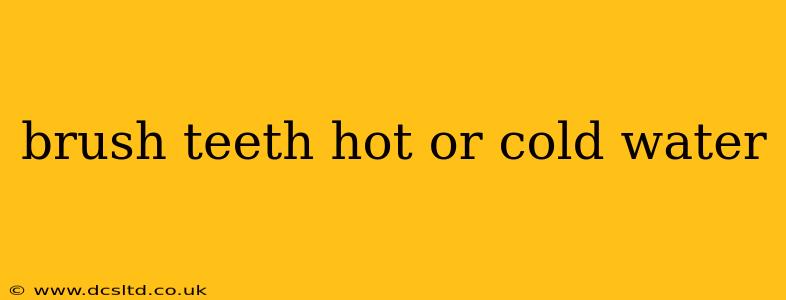The age-old question: is it better to brush your teeth with hot water or cold water? The answer, as with many things related to health, isn't a simple yes or no. The ideal water temperature for brushing your teeth is actually lukewarm, striking a balance that maximizes both comfort and effectiveness. Let's delve deeper into why.
Why Lukewarm Water Is Best for Brushing Your Teeth
Using lukewarm water offers several advantages:
-
Enhanced Toothpaste Effectiveness: Many toothpastes contain ingredients that are more effectively activated and dispersed in lukewarm water. This ensures that the fluoride and other beneficial components of your toothpaste can thoroughly coat and protect your teeth.
-
Gentle on Sensitive Teeth: Extremely hot water can irritate sensitive gums and teeth, potentially causing discomfort or even pain. Conversely, while cold water might feel refreshing, it can also increase sensitivity in some individuals. Lukewarm water provides a comfortable middle ground, minimizing these potential irritations.
-
Optimal Cleaning: Hot water can potentially soften enamel, making your teeth slightly more vulnerable to damage. Cold water, while not damaging enamel, might not be as effective at dissolving certain components of toothpaste. Lukewarm water provides the perfect balance for effective cleaning without compromising enamel integrity.
What About Hot Water? Is it Harmful?
While lukewarm water is recommended, using exceptionally hot water isn't inherently dangerous in a single instance. However, consistently using very hot water can potentially lead to:
-
Increased Sensitivity: The heat can irritate the nerves in your teeth and gums, leading to heightened sensitivity over time.
-
Enamel Damage: Prolonged exposure to high temperatures can weaken and soften tooth enamel, increasing the risk of cavities and other dental problems.
What About Cold Water? Is it Less Effective?
Cold water isn't harmful, but it might not be as effective as lukewarm water. Cold temperatures can hinder the activation of certain toothpaste ingredients, potentially reducing the overall effectiveness of your brushing routine. Moreover, some people find cold water to increase tooth sensitivity.
Does Water Temperature Affect Bleeding Gums?
Is it true that hot water can help with bleeding gums? No, hot water is not a recommended treatment for bleeding gums. Bleeding gums are often a sign of gum disease (gingivitis) and should be addressed by a dentist. While hot water might temporarily alleviate some discomfort, it won't treat the underlying issue. Focus on gentle brushing techniques and maintaining good oral hygiene.
Can cold water worsen bleeding gums? Cold water itself doesn't worsen bleeding gums, but if you have sensitive gums, the cold might increase discomfort. Gentle brushing with lukewarm water and a soft-bristled toothbrush is key.
What is the ideal brushing technique?
Regardless of water temperature, proper brushing technique is crucial for optimal oral health. Use a soft-bristled toothbrush and brush gently in small circular motions for at least two minutes, twice a day. Don't forget to brush your tongue to remove bacteria and freshen breath.
Conclusion: The Goldilocks Zone for Brushing
The best water temperature for brushing your teeth is lukewarm – not too hot, not too cold, but just right. This temperature offers the perfect balance between comfort, effectiveness, and dental health. Remember to maintain good oral hygiene practices, including regular dental checkups, for a healthy and radiant smile.
